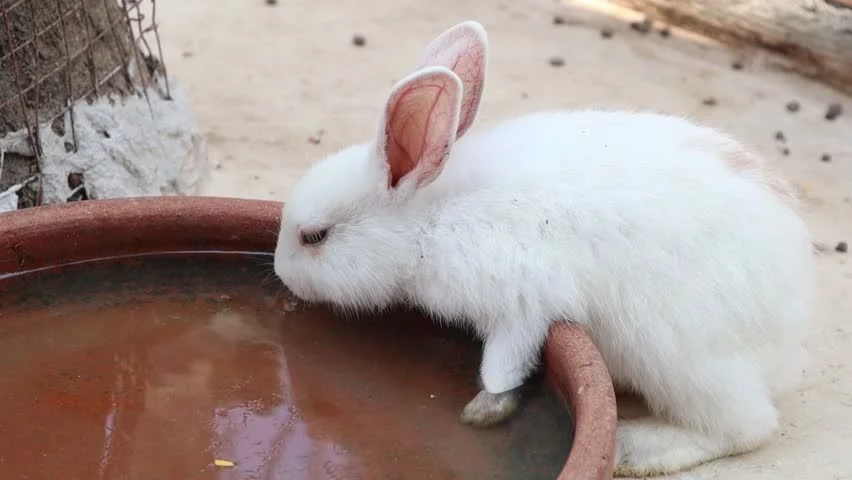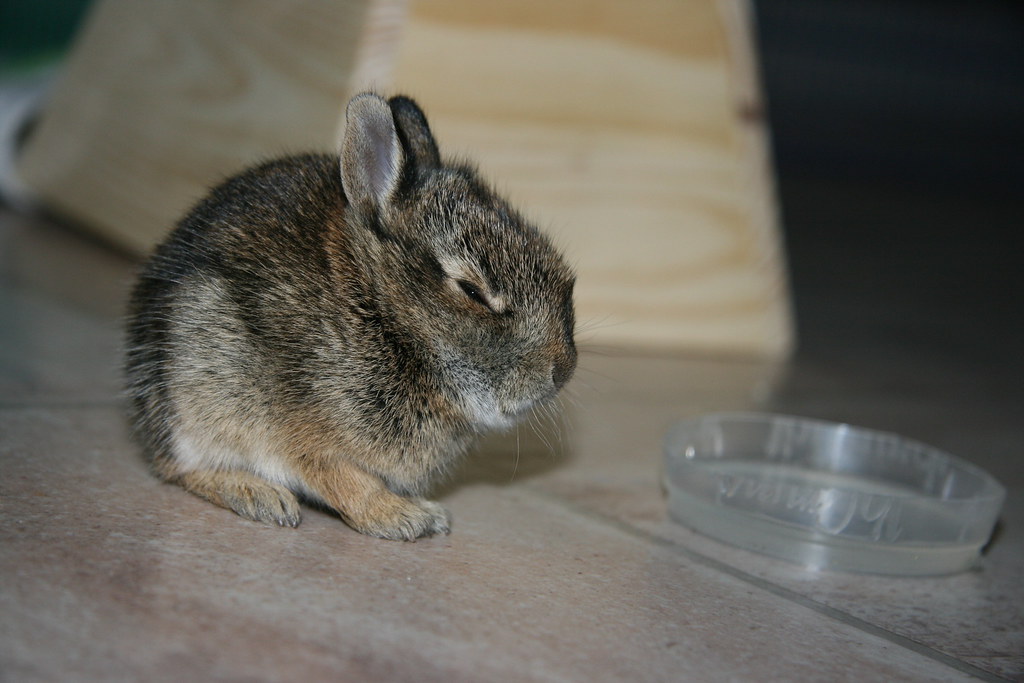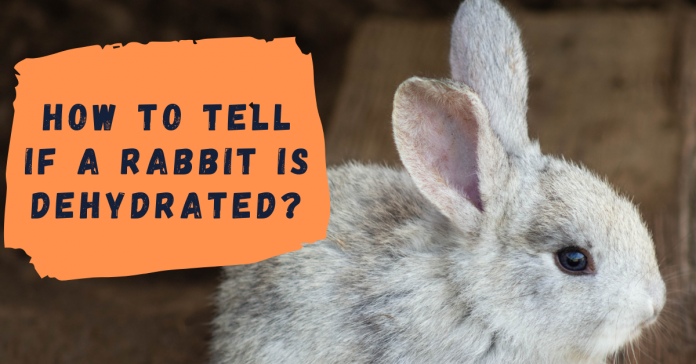One of my friends who raise rabbits has relocated to a hot country. After a period of 3 days of relocation, she observed that her rabbit has suddenly stopped drinking water and also panted due to heat. In her case, it was predominant that the external temperature has dehydrated the rabbit.
Back in 2019, one of my rabbits was suddenly displaying hatred towards food. While observing her for two continuous hours, I noticed that she is feeling dehydrated. I was able to bring her back to normalcy in less than 1 hour. How to tell if a rabbit is dehydrated? Well, in this article, I am going to tell you what I followed so you can do the same for your bunny.
How much water does a rabbit drink?
Rabbits, on average, drink at least a quarter-liter of water per day and this is consumed through pellet, vegetables, and hay in addition to water. The water content in regular rabbit foods keeps them hydrated. When your bunny is not eating well, there is a likelihood for dehydration and you need to take measures in advance.
Here’s a table on water consumption according to the age of rabbits:
| Age of Rabbit | Water Consumption |
| 0-3 months | 4-6 oz per day |
| 3-6 months | 6-8 oz per day |
| 6-12 months | 8-10 oz per day |
| 1-2 years | 10-12 oz per day |
| 2-4 years | 12-16 oz per day |
| 4+ years | 16-20 oz per day |

If you need more information on how much water does a rabbit need to drink, follow the steps below.
- A rabbit of the normal size and shape requires a minimum of a quarter-liter (250mL) per day. If your bunny is big enough, increase the water quantity proportionally.
- Quarter liter per day is ideal if your rabbit is moderately active. However, extremely active rabbits need more water and you can also give more pellets and vegetables rich in water to keep up the energy.
- When the external temperature is high, increase the quantity of water as much as possible.
Note – I would always advise the bunny owner to keep an eye on eating patterns, activity type, diet nature, and size to determine the water. My bunny is estimated to consume anywhere between 250-270mL water each day.
Why is my rabbit not drinking water?
Your rabbit is not drinking water due to one of these reasons – change in water taste, temperature inconvenience, boring diet pattern, sickness, and tooth problem.
- Boring diet – Sometimes, a rabbit becomes bored of the same diet being repeated each day. As a result, there is hatred in consuming the same one more time.
- Inconvenient temperature – The ambiance surrounding the bunny matters so much. When the temperatures are rough, rabbits prefer security over the water and hence, cut down water consumption.
- Change in water taste – This occurs commonly if you have relocated your place or have not maintained your bunny’s place. It takes time for a rabbit to adapt to a new water taste. Though rabbits are fussy, they also prefer their place to be clean.
- Tooth problem – Pellets and vegetables increase the hydration level of a rabbit but a problem with the tooth can force the rabbit to skip drinking water.
- Sickness – This can happen due to prolonged dehydration affecting the gut or intestine. Perhaps, there could be other problems preventing your rabbit from drinking water.
How to tell if your rabbit is dehydrated?
Having handled several rabbits for a decade, I have wrapped up and written down the common signs of a dehydrated rabbit so you can develop an action plan to fix the problem.
- Hard tummy
- Urine smells bad
- Eating little to no food
- Lethargic
- Sticks to a place
- Extreme disorientation
- Sudden fever
- Hard feces
- Rolling out of discomfort
- Weird movements
- Shrinking and scared looks
As much as it is hard for us to overcome dehydration, a rabbit develops signs of dying if dehydration is not noticed in the early stages.
How to rehydrate my rabbit?
Here comes the most important section of this article. Following are the steps I followed exactly to rehydrate my rabbit and it works.

- Quickly set up a warm place.
- Take a 5mL syringe and fill it with water. Give it once in 10 mins and you can see a visible difference in the first hour.
- Rub the stomach so that digestion happens naturally.
Note – There are times when these might not work. In that case, you need to rush to a vet to get IV fluids injected. This will help in regaining energy and developing activity levels.
Why is water needed for rabbits?
Water is an essential nutrient for rabbits, and it is crucial to their overall health and well-being. As a responsible rabbit owner, you must understand why water is necessary for your furry friend. Here are some reasons why water is needed for rabbits:
- Hydration – Water is the primary component of the body, and it is essential for maintaining proper hydration levels in rabbits. Without enough water, your rabbit can become dehydrated, which can lead to a range of health problems, including kidney damage.
- Digestion – As herbivores, rabbits consume a diet that is high in fiber. Fiber is necessary for digestive health, but it requires a lot of water to move through the digestive system. Without enough water, rabbits can suffer from digestive problems, including constipation and diarrhea.
- Temperature regulation – Rabbits are sensitive to heat, and they can easily become overheated. Water helps rabbits regulate their body temperature by allowing them to sweat and cool down.
- Kidney function – Rabbits have a unique digestive system that produces two types of feces – soft feces and hard feces. The soft feces are rich in nutrients and are eaten by the rabbit to reabsorb those nutrients. However, soft feces contain a lot of water, which means that rabbits need to drink enough water to produce them. Without enough water, rabbits can develop kidney problems, as their kidneys will have to work harder to produce concentrated urine.
As you can see, water is vital to the health and well-being of your rabbit. It is essential to make sure that your rabbit always has access to fresh, clean water to ensure their hydration, digestion, temperature regulation, and kidney function are all functioning correctly.
How to make rabbits drink water?
The easiest way to avoid rabbit dehydration is to keep your surroundings clean and provide 24/7 access to water and water-rich foods.
Years have passed but none of my rabbits have experienced dehydration.
Here are the key steps I followed.
- Change water each day
- Wash the water bowl regularly so that it has no bacteria/fungi
- On the water outlet, give the taste of a banana or a sweet substance. This is meant to persuade the rabbit to drink water relishing this taste.
- Regular washing is different from sanitizing the bowl. I sanitize the bowl with hot water and chemical-free soap water. The idea here is to ensure that there is no dirt sticking to the end of the bowl.
- Include more leafy vegetables that are fiber and water-rich.
- Clean the poop area of the rabbit.
- Constantly interact with the bunny to determine abnormalities in advance.
- Ensure water and food are available all day.
- Check out if the rabbit is frightened for any reason and set the environment sans predators.
Hydrating foods for rabbits:
- Lettuce – Lettuce is a great source of hydration for rabbits, as it is over 90% water.
- Cucumber – Cucumbers are also high in water content, with a hydration percentage of around 95%.
- Celery – Celery is another hydrating vegetable, with a water content of around 95%.
- Watermelon – Watermelon is a hydrating fruit that rabbits can enjoy in moderation, with a water content of around 92%.
- Radicchio – Radicchio is a leafy green vegetable that is around 95% water and can be a great addition to your rabbit’s diet.
- Bell peppers – Bell peppers are a hydrating vegetable that can provide your rabbit with important vitamins and minerals. They have a water content of around 92%.
- Zucchini – Zucchini is another hydrating vegetable that can be a great addition to your rabbit’s diet, with a water content of around 95%.
By incorporating these hydrating foods into your rabbit’s diet, you can help ensure that they are getting the proper hydration they need to stay healthy and happy. Remember to introduce new foods gradually and to feed them in moderation as they should not replace water as the main source of hydration for rabbits.
What do rabbits do when dehydrated?
When rabbits are dehydrated, they may become lethargic and lose their appetite. Their skin may also become less elastic and their eyes may appear sunken. In severe cases, rabbits may experience seizures or collapse.
To prevent dehydration, it’s important to provide your rabbit with fresh water at all times. You can also encourage your rabbit to drink more water by adding fresh vegetables and fruits with high water content to their diet. Additionally, during hot weather or when your rabbit is sick, you may need to provide additional sources of hydration such as electrolyte solutions or subcutaneous fluids.
If you suspect that your rabbit is dehydrated, it’s important to seek veterinary care immediately. Your veterinarian can provide supportive care such as fluids and electrolytes to help your rabbit recover. By staying vigilant and providing your rabbit with proper hydration, you can help ensure their health and well-being.
Frequently Asked Questions:
1. How long can a rabbit not drink water?
A rabbit should not go without water for more than 24 hours. Dehydration can lead to serious health problems and even death. If you notice your rabbit not drinking water, it’s important to seek veterinary care immediately to prevent any health complications.
2. How many times should a rabbit drink water?
Rabbits should have access to fresh water at all times and should drink water whenever they feel thirsty. On average, rabbits drink water 6-8 times a day, but this can vary depending on their age, activity level, and diet. It’s important to monitor your rabbit’s water intake to ensure they are staying hydrated.
3. What food is hydrating for rabbits?
Fresh vegetables and fruits with high water content are hydrating for rabbits. Some examples include lettuce, cucumber, celery, and watermelon. It’s important to introduce these foods gradually to avoid digestive issues, and to feed them in moderation as they should not replace water as the main source of hydration for rabbits.
4. Is warm water good for rabbits?
Warm water can be beneficial for rabbits in certain situations, such as during cold weather or when the rabbit is sick. However, it’s important not to give water that is too hot as it can cause burns or scalding. Room-temperature water is generally the best option for rabbits.
Conclusion
Ideally, a bunny needs sufficient water to stay active. Behavioral and physical changes are predominant when a bunny is becoming dehydrated. Sometimes, old or heavy rabbits tend to struggle drinking water due to the excess activity needed. In that case, spoonfeeding helps!


